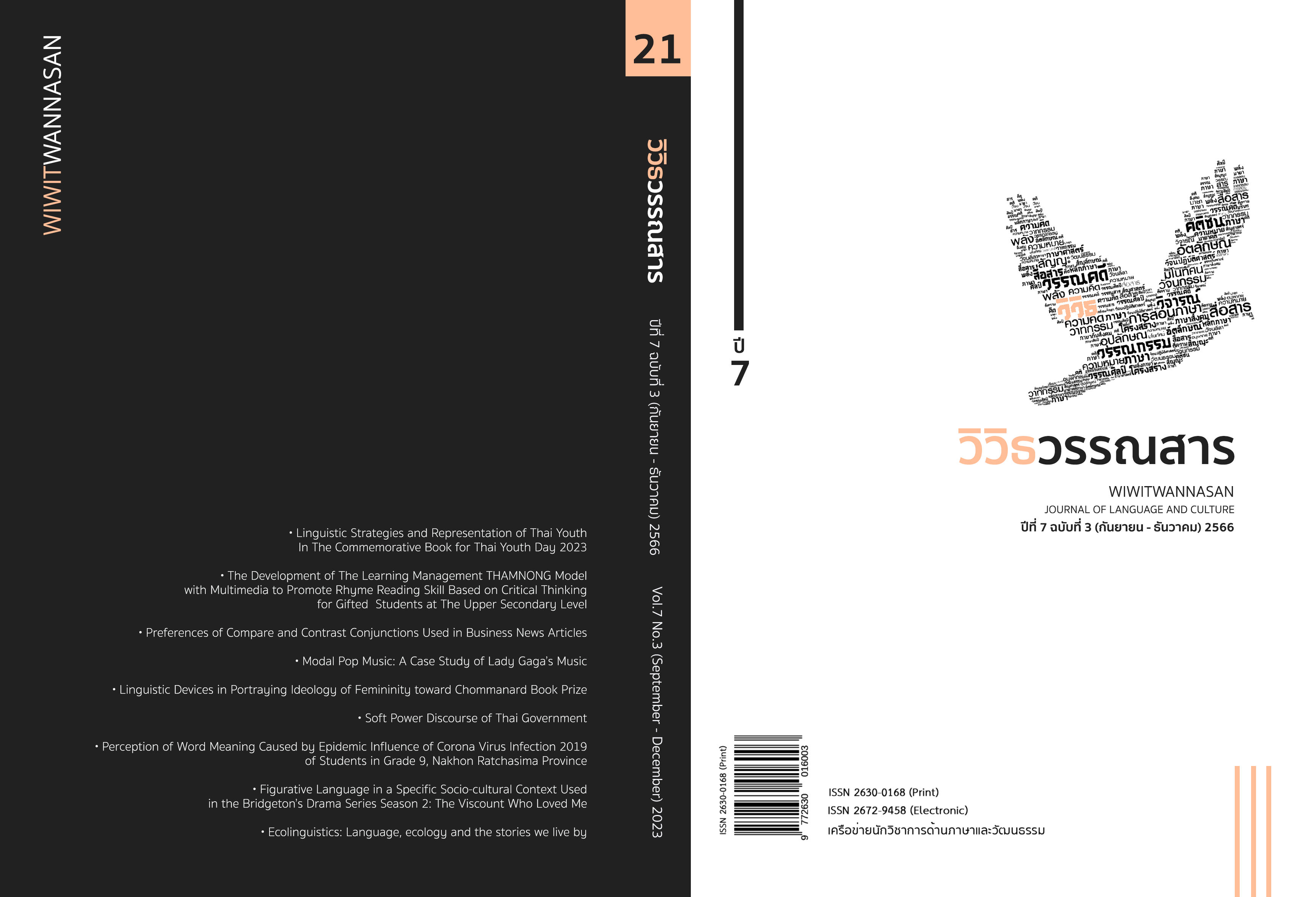ภาษาศาสตร์เชิงนิเวศ: ภาษา นิเวศวิทยา และเรื่องราวอยู่รอบตัว
Main Article Content
บทคัดย่อ
บทความนี้มีวัตถุประสงค์เพื่อทบทวนชุดภาษาศาสตร์เชิงนิเวศ: ภาษา นิเวศวิทยา และเรื่องราวที่เราศึกษาอยู่นั้นแตกต่างกันไปในด้านความซับซ้อน ความครอบคลุม การวิเคราะห์เชิงลึก และแรงจูงใจ แต่ลักษณะทั่วไปบางประการของแนวทางภาษาศาสตร์เชิงนิเวศน์ในการวิเคราะห์วาทกรรมมีอธิบายไว้ด้านล่าง 1) จุดเน้น อยู่ในวาทกรรมที่มีหรืออาจมีผลกระทบอย่างมีนัยสำคัญ ไม่เพียงแต่ต่อวิธีที่ผู้คนปฏิบัติต่อผู้อื่น แต่ยังรวมไปถึงวิธีที่พวกเขาปฏิบัติต่อระบบนิเวศที่ใหญ่กว่าที่ชีวิตต้องพึ่งพา 2) วิเคราะห์วาทกรรมโดยแสดงให้เห็นว่ากลุ่มคุณลักษณะทางภาษามารวมกันเพื่อสร้างโลกทัศน์หรือรหัสวัฒนธรรมโดยเฉพาะ รหัสวัฒนธรรมคือชุดค่านิยม บรรทัดฐาน จริยธรรม และความเชื่อทางสังคมที่ใช้ร่วมกันซึ่งสร้างและสะท้อน "สามัญสำนึก" ของชุมชน ตัวอย่างคือรหัสที่แพร่หลายซึ่งมองว่าการเติบโตทางเศรษฐกิจอย่างไม่จำกัดเป็นทั้งที่เป็นไปได้และเป็นเป้าหมายที่พึงปรารถนาสำหรับสังคมมนุษย์ 3) เกณฑ์ที่ใช้ตัดสินโลกทัศน์นั้นมาจากปรัชญานิเวศวิทยา (หรือนิเวศน์วิทยา) ที่ชัดเจนหรือโดยปริยาย นิเวศน์วิทยาได้รับแจ้งจากทั้งความเข้าใจทางวิทยาศาสตร์ว่าสิ่งมีชีวิต (รวมถึงมนุษย์) ต้องอาศัยปฏิสัมพันธ์กับสิ่งมีชีวิตอื่นและสภาพแวดล้อมทางกายภาพอย่างไรเพื่อความอยู่รอดและเจริญรุ่งเรือง และยังมีกรอบทางจริยธรรมในการตัดสินใจว่าเหตุใดการอยู่รอดและความเจริญรุ่งเรืองจึงมีความสำคัญ และการอยู่รอดและความเจริญรุ่งเรืองของใคร 4) การศึกษานี้มีวัตถุประสงค์เพื่อเปิดเผยและดึงความสนใจไปยังวาทกรรมที่ดูเหมือนจะทำลายระบบนิเวศ 5) การศึกษานี้มุ่งเป้าไปที่การประยุกต์ใช้ในทางปฏิบัติโดยสร้างความตระหนักรู้ถึงบทบาทของภาษาในการทำลายหรือปกป้องระบบนิเวศ การแจ้งนโยบาย การแจ้งการพัฒนาการศึกษา หรือการเสนอแนวคิดที่สามารถนำไปใช้ในการออกแบบตำราที่มีอยู่ใหม่หรือผลิตตำราใหม่ในอนาคต
Article Details

อนุญาตภายใต้เงื่อนไข Creative Commons Attribution-NonCommercial-NoDerivatives 4.0 International License.
ลิขสิทธิ์ของบทความเป็นของวารสาร การพิมพ์ซ้ำจะต้องได้ร้บการอนุญาตจากบรรณาธิการวารสาร
เอกสารอ้างอิง
Stibbe, A. (2015). Ecolinguistics: Language, Ecology and the Stories We Live by. London;
New York, NY: Routledge.
________. (2015) Ecolinguistics: Language, Ecology and the Stories We Live By. London;
New York, NY: Routledge.
Foust, C. and O’Shannon Murphy, W., 2009. Revealing and reframing apocalyptic tragedy in global warming discourse. Environmental Communication: A Journal of Nature and Culture, 3 (2), 151–167.
Goatly, A., 2001. Green grammar and grammatical metaphor, or language and myth of power, or metaphors we die by. In: A. Fill and P. Mühlhäusler, eds. The ecolinguistics reader: language, ecology, and environment. London: Continuum, 203–225.
Glenn, C.B., 2004. Constructing consumables and consent: a critical analysis of factory farm industry discourse. Journal of Communication Inquiry, 28 (1), 63–81.
Benwell, B. and Stokoe, E., 2006. Discourse and identity. Edinburgh University Press.
Machin, D. and Mayr, A., 2012. How to do critical discourse analysis: a multimodal introduction. London: Sage.
Korten, D., 2006. The great turning: from empire to Earth community. San Francisco: Berrett-Koehler.
Kingsnorth, P. and Hine, D., 2009. The Dark Mountain Project manifesto [online]. Available from:
http://dark-mountain.net/about/manifesto/ [Accessed 31 May 2014].


